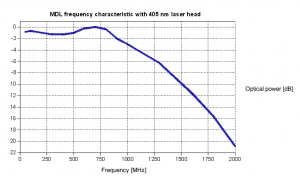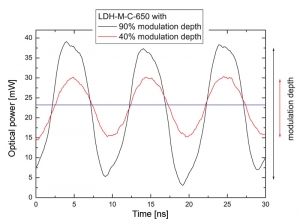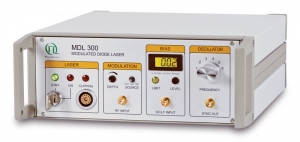Nanosecond Pulse Shaping
MDL 300 (discontinued)
Modulated Diode Laser
- Linear modulation, any waveform
- Modulation frequencies up to 1.8 GHz (external source required)
- Internal sine wave oscillator up to 250 MHz (6 predefined frequencies)
- External Bias control/LF modulation
- Adjustable modulation depth
- Laser heads for wavelengths from 375 to 1550 nm
- Power levels from 10 to 70 mW peak, 5 to 35 mW average
The MDL 300 is discontinued as of November 2018.
Please check our Nanosecond Pulse Shaping lasers as an alternative.
The MDL 300 laser systems consists of a universal driver and different laser heads for different wavelengths. It has a build-in internal sine wave generator but can also work with an external modulation signal.
Internal or external modulation
The MDL 300 permits to generate modulated laser output via internal or external modulation. At internal modulation, sinusoidal output can be generated at six user-selectable modulation frequencies of 250, 100, 25, 5, 1 and 0.25 MHz. All frequencies exhibit a high stability and are derived from a low-jitter crystal generator. For other waveforms or frequencies up to modulation frequencies of 1.8 GHz, the MDL 300 provides two connectors for external modulation signals. A synchronization output at the front panel allows the modulation signal to be monitored externally.
Modulation up to 1.8 GHz with adjustable depth
 The modulation depth of the laser output can be controlled by the front panel settings for any modulation frequency. It can be varied in the range of typically 30 dB and is working as an adjustable multiplier for any waveform. The modulation depth depends on the modulation frequency and the frequency response of the modulation amplitude is different for every wavelength. Typical frequency responses are fairly flat until about 600 MHz to 900 MHz where the modulation amplitude drops to 50 % (3 dB bandwidth). Modulation (with lower gain) is still possible up to 1.8 GHz.
The modulation depth of the laser output can be controlled by the front panel settings for any modulation frequency. It can be varied in the range of typically 30 dB and is working as an adjustable multiplier for any waveform. The modulation depth depends on the modulation frequency and the frequency response of the modulation amplitude is different for every wavelength. Typical frequency responses are fairly flat until about 600 MHz to 900 MHz where the modulation amplitude drops to 50 % (3 dB bandwidth). Modulation (with lower gain) is still possible up to 1.8 GHz.
Regulated output power
 The average output power of the MDL 300 is regulated by a control loop that measures the optical output with a monitor photodiode. This control loop is slow enough to allow high frequency modulation via an external input signal. The corresponding RF input has a highpass behaviour and allows modulation frequencies between 100 kHz and 2 GHz.
The average output power of the MDL 300 is regulated by a control loop that measures the optical output with a monitor photodiode. This control loop is slow enough to allow high frequency modulation via an external input signal. The corresponding RF input has a highpass behaviour and allows modulation frequencies between 100 kHz and 2 GHz.
The average output power can additionally be changed through the set-point of that control loop. Either manually by turning the bias level potentiometer or electrically through the DC/LF input. As the modulation may never work “against” the control loop, the region around its own time constant (1 kHz to 100 kHz) is blocked.
Average optical output power up to 35 mW
The laser heads of the LDH-M Series are available at various wavelengths between 375 nm and 1550 nm. The average optical output power emitted by the laser heads depends on the wavelength and is typically between 5 mW and 35 mW. At modulation depths up to 90 % around the average optical output power, this corresponds to peak powers of more than 60 mW. The laser heads include collimation optics and can optionally be fitted to single or multimode optical fibers.
The MDL 300 is discontinued as of November 2018.
| Internal Clock | |
|---|---|
| Modulation frequencies | 250, 100, 25, 5, 1 and 0.25 MHz |
| Waveform | sinusoidal |
| External RF Modulation Input | |
| Amplitude | 50 mVrms typ., 2 Vrms max. |
| Impedance | 50 Ohms (100 kHz to 2 GHz) |
| 200 Ohms (static) | |
| Frequency range | 100 kHz up to 2 GHz |
| Connector | SMA female |
| External DC/LF Modulation Input | |
| Amplitude | 0 to +5 Vrms max. |
| Impedance | 10 kOhms pull up |
| Frequency range | DC to 1 kHz |
| Connector | SMA female |
| Sync Output | |
| Amplitude | 0.3 Vrms max. |
| Impedance | 50 Ohms |
| Connector | SMA female |
| Power Supply | |
| Line Voltage | 220/240 or 110/120 VAC, 50/60 Hz |
| Power consumption | max. 45 Watts |
| Physical | |
| Dimensions | 237 × 310 × 97 mm (w × d × h) |
All Information given here is reliable to our best knowledge. However, no responsibility is assumed for possible inaccuracies or omissions. Specifications and external appearances are subject to change without notice.
The MDL 300 is discontinued as of November 2018.
The table lists the available laser heads of the LDH-M Series for the MDL 300.
| Type | Wavelength (±10) [nm] |
Max. cw power [mW] |
fmax (-3 dB) [MHz] |
fmax (-10 dB) [MHz] |
| LDH-M-C-375 | 375 | 5 | 900 | 1400 |
| LDH-M-C-405 | 405 | 20* | 900 | 1500 |
| LDH-M-C-440 | 440 | 20 | 900 | 1400 |
| LDH-M-C-470 | 470 | 7.5 | 1100 | 1500 |
| LDH-M-C-485 | 485 | 4 | 800 | 1100 |
| LDH-M-C-635 | 635 | 8 | 600 | 1200 |
| LDH-M-C-650 | 660 | 7 | 600 | 1000 |
| LDH-M-C-650B | 660 | 20* | 900 | 1300 |
| LDH-M-C-670 | 670 | 8 | 800 | 1600 |
| LDH-M-C-780 | 780 | 30 | 700 | 1200 |
| LDH-M-C-805 | 808 | 30 | 700 | 1400 |
| LDH-M-C-830** | 830 | 15 | 700 | 1300 |
| LDH-M-C-840 | 840 | 35 | 650 | 1100 |
| LDH-M-C-850 | 850 | 7 | 800 | 1800 |
| LDH-M-C-905 | 905 | 35 | 600 | 1000 |
| LDH-M-C-930 | 930 | 30 | 800 | 1400 |
| LDH-M-C-980 | 980 | 35 | 600 | 1200 |
| LDH-M-C-1060 | 1060 | 35 | 800 | 1400 |
| LDH-M-C-1310 | 1310 | 10 | 800 | 1400 |
| LDH-M-C-1550 | on request | |||
Other wavelengths and optical power levels are available on demand. Please ask PicoQuant for more information.
Typical output power fluctuations 3 %
*Output power fluctuations 10 %
** Transversal multi-mode structure, reduced coupling efficiency into single-mode fibers.
All measurements may be subject to a 10 % calibration error.
All laser heads include peltier cooling and collimation optics. Optionally for most wavelengths single- and multi-mode optical fibers can be fitted through appropriate fiber couplers.

All Information given here is reliable to our best knowledge. However, no responsibility is assumed for possible inaccuracies or omissions. Specifications and external appearances are subject to change without notice.
The MDL 300 is discontinued as of November 2018.
The MDL 300 laser system can be used for various applications, where modulated laser output is important, such as:
- Testing and analysis of optoelectronic components
- Fiber Optic Communications
The MDL 300 is discontinued as of November 2018.
The following documents are available for download:
Latest 10 publications referencing MDL 300
The following list is an extract of 10 recent publications from our bibliography that either bear reference or are releated to this product in some way. Do you miss your publication? If yes, we will be happy to include it in our bibliography. Please send an e-mail to info@picoquant.com containing the appropriate citation. Thank you very much in advance for your kind co-operation.



